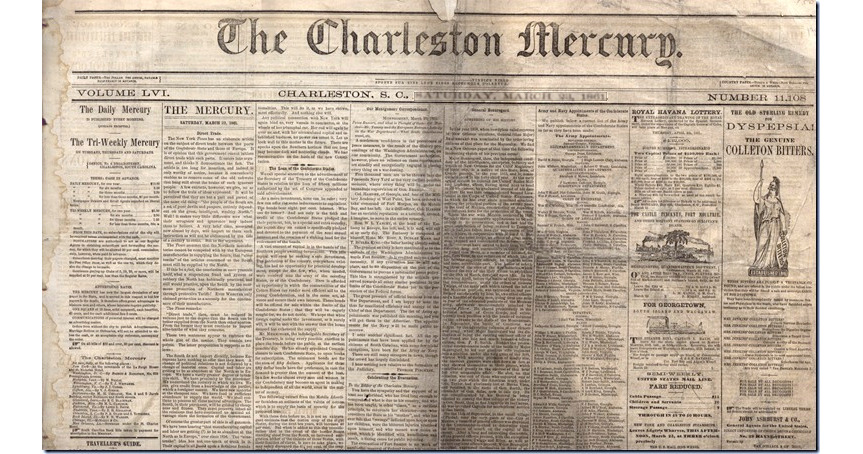May 29, 1863, The Charleston Mercury
(CORRESPONDENCE OF THE MERCURY.)
RICHMOND, May 25.
Quite a pleasant and unexpected change from the intolerable heat of last week occurred this morning. The dust is laid, the day is cool and humid – fine weather for marching.
PEMBERTON’S despatches to the President are encouraging to outsiders. But a Government officer said yesterday that Pemberton had in the fight at Big Black Bridge so few men that he was ashamed to tell their number. His assertion that his men are cheered with the belief that Johnston is near with a large army, is not satisfactory, for we all know what Johnston’ force is. Our main hope is in the obstinacy of the men inside the defences, the strength of the works, and the effect of the bad water on Grant’s army. – People have been appealed to come and fight. Conscript law has never been rigidly enforced. But let us hope for the best. We have an able Secretary and an able General.
The facts in regard to the ladies confined in Chancellor house are not given correctly by the papers. I get them from a direct source. Mrs. Chancellor, an old lady of 60 or 70, mother of a surgeon in our army and a relative of the owner of the house, had moved from Loudoun to Chancellor, as the place of all others which the Yankees would never reach. Other ladies, to the number of 12 or 13, were there. Gen. Percy had promised to give them warning of the enemy’s approach, but Hooker’s advance was made so suddenly that they were caught. All the white people for miles around, down to children eight years old, were imprisoned, to prevent their giving information to our troops. Hooker’s headquarters were at Chancellor. When the battle came on, the ladies entreated him to let them depart; he not only refused, but confined them all in one room and locked the door on the outside. For his own protection, and of his wounded as well, he hoisted the hospital flag, but the house was pierced for the use of sharpshooters, and used by them. It was not until the house had been fired and the roof had fallen in that the ladies were released. They were then marched between the two lines of fire, but fortunately only one servant girl was injured – a piece of shell striking her slightly on the head. Afterwards, the whole party, ladies, old and young, servants and children, were marched on foot fifteen miles, and not permitted to return until Gen. Lee made a positive demand for them, enforcing it by a refusal to surrender Hooker’s wounded until they were released. These ladies knew nothing of the burning to death of 250 Yankee wounded; but, if such were the case, it was only a just retribution for Hooker’s inhumanity.
Everybody in town and country assures you that Lee will make a forward movement sometime this week. They say Hood is in the advance, and our cavalry concentrating in the rear, etc. If Hooker is not able to foil this movement, it will not be for the want of information. But why do regiments continue to come this way?
Jones’ late expedition to the Baltimore and Ohio Railroad was virtually a failure. He might have destroyed the Cheat River Viaduct – had the man who planned and built it to show him how; and there were only two weak regiments to guard it, and they were ready to burn it themselves had he pressed them. He might also have destroyed a very large depot in Pennsylvania, if he had not become scared when within two miles of the place. So the valley people say, who never had any confidence in Jones.
Ewell and A.P. Hill are Lieutenant-Generals, the former commission dating one day previous to that of the latter. Heth, the hero of Louisburg, the would-be superseder of Price, is a Major-General.
HERMES.
